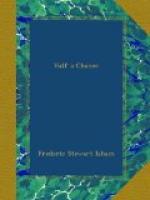His back was turned to the judge, who stirred nervously, but waited a fraction of a second before he spoke.
“If the cross-examination is finished—” he began.
John Steele wheeled; his face changed; a smile of singular charm accompanied his answer.
“Your lordship will pardon me; the human mind has its aberrations. At the moment, by a curious psychological turn, a feature of another problem seized me; it was like playing two games of chess at once. Perhaps your honor has experienced the sensation?”
His lordship beamed. “Quite so,” he observed unctuously. “I have to confess that once in a great while, although following a case very closely, I have found it possible to consider at the same time whether I would later have port or sherry with my canvasback.”
Of course every one smiled; the business of the morning ran on, and John Steele, at length, concluded his cross-examination. “I think, your Lordship, the question of the reliability of this man, as a witness, in this, or—any other case—fully established.”
“Any other case?” said his lordship. “We are not trying any other case.”
“Not now, your Lordship.” John Steele bowed. “I ask your lordship’s indulgence for the”—an instant’s ironical light gleamed from the dark eyes—“superfluity.”
“Witness may go,” said his lordship bruskly.
Dandy Joe, a good deal damaged in the world’s estimation, stepped down; his erstwhile well-curled mustache of brick-dust hue seemed to droop as he slunk out of the box; he appeared subdued, almost frightened,—quite unlike the jaunty little cockney that had stepped so blithely forth to give his testimony.
The witnesses all heard, John Steele, for the defense, spoke briefly; but his words were well-chosen, his sentences of classic purity. As the girl listened, it seemed to her not strange that Captain Forsythe, as well as others, perhaps, should be drawn hither on occasions when this man appeared. Straight, direct logic characterized the speech from beginning to end; only once did a suggestion of sentiment—curt pity for that gin-besotted thing, the prisoner!—obtrude itself; then it passed so quickly his lordship forgot to intervene, and the effect remained, a flash, illuminating, Rembrandt-like!
Time slipped by; the judge looked at his watch, bethought him of a big silver dish filled with an amber-hued specialty of the Ship and Turtle, and adjourned court. His address interrupted by the exigencies of the moment, John Steele began mechanically to gather up his books; his face that had been marked by the set look of one determined to drive on at his best with a task, now wore a preoccupied expression. The prisoner whined a question; Steele did not answer, and some one bustled the man out. Having brought his volumes together in a little pile, Steele absently separated them again; at the same time Sir Charles and his party walked toward the bench. They were met by his lordship and cordially greeted.




